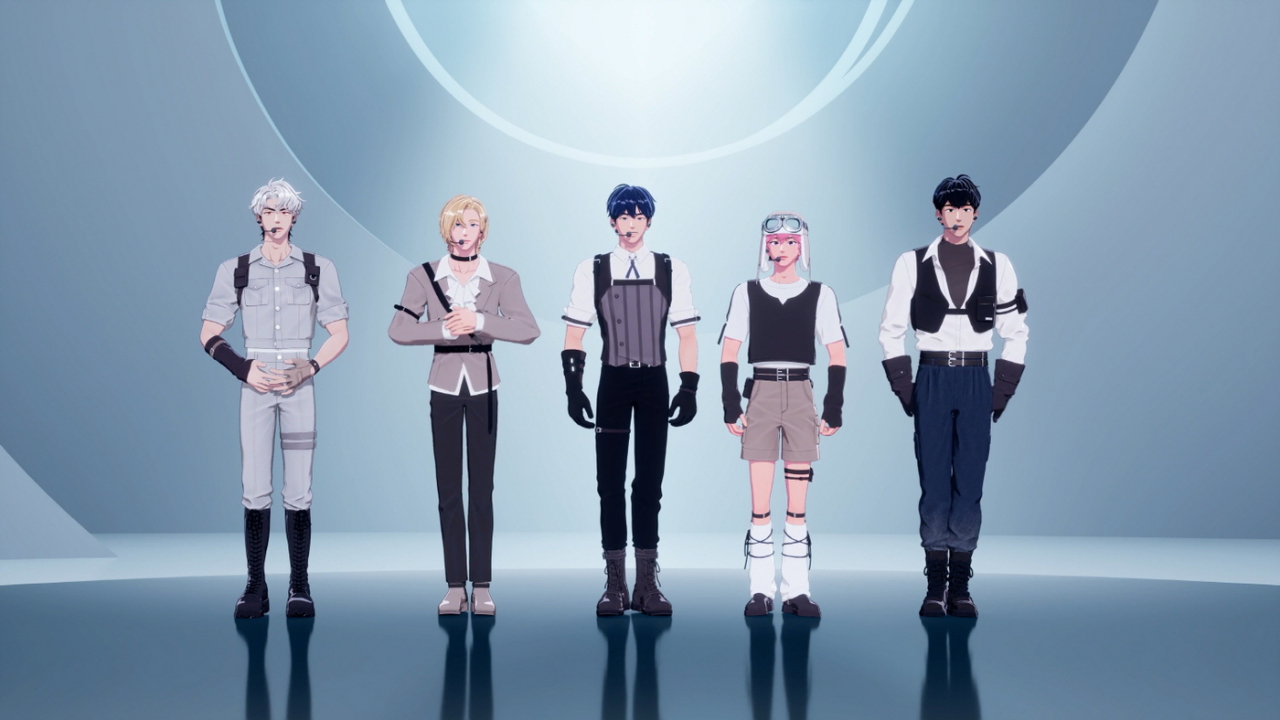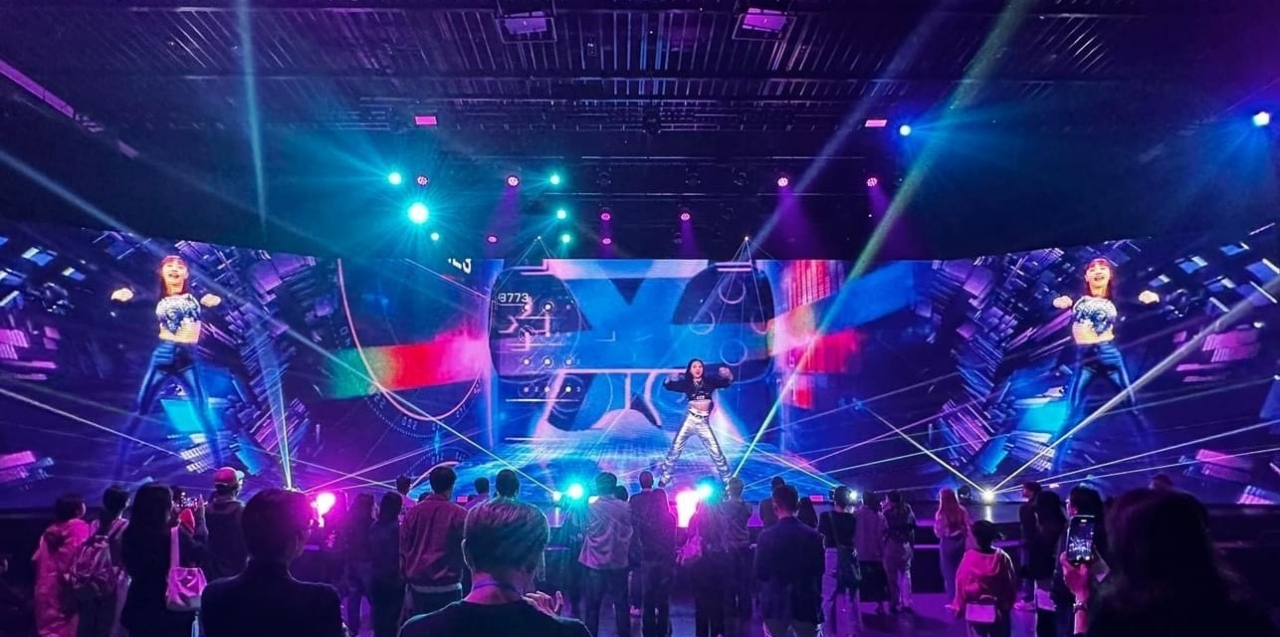Are virtual idols for real?
Tech, entertainment companies partner up to explore new frontier in K-pop market
By Hong YooPublished : March 4, 2024 - 13:54

From getting good songs and choreographies to holding in-person concerts, things are tough for virtual idols in the highly competitive K-pop scene.
“When our virtual idol group Plave was looking for songs, our group members said they felt the composers were not giving them A-level quality songs. That led the group to make their own songs,” said Lee Sung-gu, CEO of Vlast, during a press conference in Seoul last Monday.
Vlast is a virtual intellectual property startup that created and manages the virtual K-pop boy group Plave.
There are two types of virtual K-pop groups — those with humans behind virtual characters and those created via artificial intelligence only.
Plave is a group of five virtual idols with real people behind the screen.
The group debuted on March 12, 2023 with the single “Asterum.”
“In the beginning, we could hardly get any songs for Iiterniti (virtual K-pop girl group). But they have begun to make a name for themselves and we now have people wanting to give us their pieces,” Heo In-kyung, director of Marketing at Pulse9, told The Korea Herald.
Pulse9, a tech company that specializes in the fields of artificial intelligence, created and manages Iiterniti.
Iiterniti, a group of 11 members also with real humans behind them, debuted on March 22, 2021 with the single “I’m Real.”
Not only is getting competitive songs difficult for virtual K-pop groups, when their concept is yet unfamiliar to most people, but getting trendy choreographies is hard too.
“We paid some 10 million won ($7,500) to a famous choreographer to make the choreography for Plave’s songs, but what we got was more like dance moves for children’s songs rather than those for a K-pop performance," said Lee. Once again, that propelled Plave members to come up with their own choreography.
It’s also hard for virtual idols to book big, well-known venues for their in-person concerts despite their fast-growing fan communities.
"We want to hold an offline concert for Plave in the second half of this year, but it is hard for us to get a venue. The venues you most likely know don’t want to host a Plave concert because they are not the mainstream,” said Lee.
“It’s easier to hold a concert of a virtual idol overseas because they have better technology and equipment compared to venues in Korea. Plus, foreigners are less hostile towards the concept of a virtual artist,” said Heo.

Virtual idols' concerts in the physical world involve using three-dimensional art on the screen and lasers to give the feeling that the audience is traveling through time and space.
If there is a real person behind a virtual idol, that person is usually behind the stage performing, with their motions tracked via motion-tracking technology. These motions are then mimicked by the virtual idol on screen in real time.
Aside from prejudice and technological difficulties, adapting to the K-pop ecosystem is another challenge to companies with virtual idols as they are essentially tech companies consisting mostly of tech employees. These companies generally have very few employees with experience in the entertainment sector.
“Promoting our virtual K-pop idol is not easy as we are not professionals at marketing artists. We are slowly learning the K-pop language and the system to provide our fans with better content. We are trying to hire employees experienced in this sector as well,” explained Lee.
Some companies choose to team up with entertainment agencies to market and promote their products, the virtual idols.
For instance, Metaverse Entertainment, the agency representing the virtual K-pop girl group Mave:, and Kakao Entertainment entered into a strategic partnership in October 2021, with Kakao Entertainment investing 12 billion won in the tech company.
Mave:, a group of four created solely through artificial intelligence, debuted on Jan. 25 last year with the single “Pandora’s Box.”
Metaverse Entertainment is solely focused on the technology behind the group Mave: while Kakao Entertainment is in charge of promoting the group, according to Metaverse Entertainment.
Meanwhile, Pulse9 works with K-pop labels to recruit K-pop trainees and artists who wish to experience working as a virtual idol.
“We’ve implemented the K-pop system so we have K-pop trainees and even artists that have already debuted, who wish to debut as virtual idols. We pick one member who is good at acting, one good at singing, one good at dancing and so on, to create a virtual group with all of their strengths,” explained Heo. “There are many who debuted as a member of a K-pop act that failed to rise to stardom looking for a second chance who choose to go behind the screens to work as virtual idols.”
Despite the difficulties and barriers virtual idols face in the K-pop scene, their presence in the industry continues to expand.
Plave sold 200,000 copies of their first mini album, “Asterum: The Shape of Things to Come,” within a week of its release and all of their following releases landed on local music streaming platform Melon’s Top 100 chart.
Mave:’s first EP, “What’s My Name,” landed on iTunes’ top album charts in five regions worldwide and on Apple Music's top album charts in two countries.
Iiterniti held a two-day offline concert “Iiterniti Begins: The Fist Journey” Oct. 14-15 last year at the Ivex Studio in Gwangmyeong, Gyeonggi Province, south of Seoul.
It is not just the flawless appearance of these virtual idols that draws fans. They are seen as providing content from “another world,” content that cannot be executed in real life such as performing in space, using magic, traveling in time and space and communicating in diverse languages.
“I feel as if I am not on planet Earth when I see their music videos or when livestreaming. That makes me forget about the worries that I have in my real life, at least for a moment. Plus, I don’t have to worry about them disappointing me with wrongdoing like real K-pop stars,” said Ju Seo-eun, a 20-year-old Mave: fan.
Indeed, one of the many advantages that virtual idols, especially those that are purely a product of AI, have over real idols is that they are free from private life controversies such as drug abuse, school violence, driving under the influence of alcohol and more that can mean the end of a career overnight.
Another advantage is that the intellectual property of virtual idols can be used in diverse genres such as webtoons, web novels and video games.
Taking advantage of this expandability, agencies with virtual idols are developing diverse intellectual properties revolving around virtual idols.
In February last year, Kakao Entertainment released a webtoon entitled “Mave: Another World” based on the girl group. It also collaborated with ModooMarble, a mobile game, to release Marty, a Mave: character, in the game.



















![[Today’s K-pop] Treasure to publish magazine for debut anniversary](http://res.heraldm.com/phpwas/restmb_idxmake.php?idx=642&simg=/content/image/2024/07/26/20240726050551_0.jpg&u=)